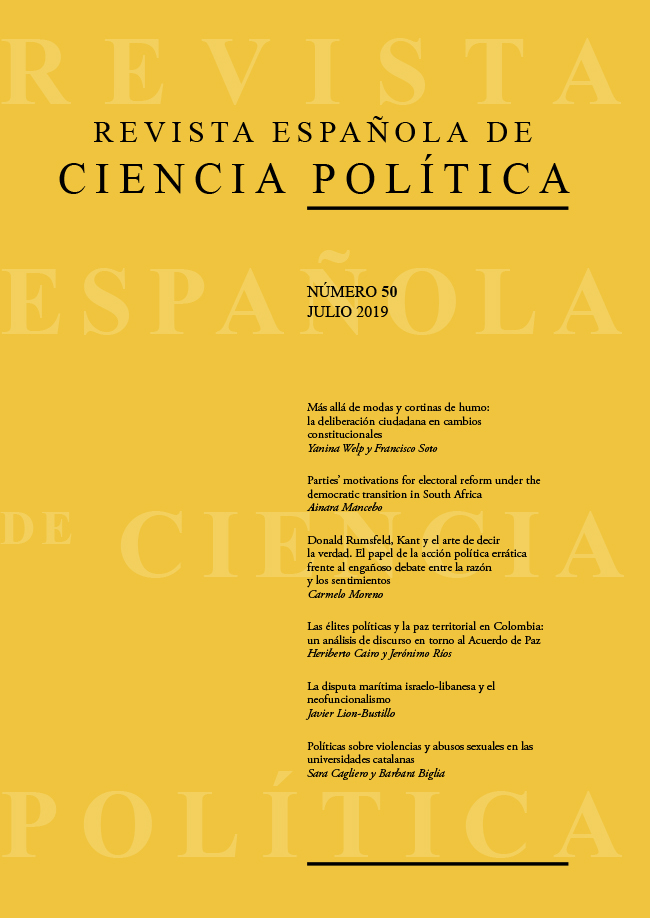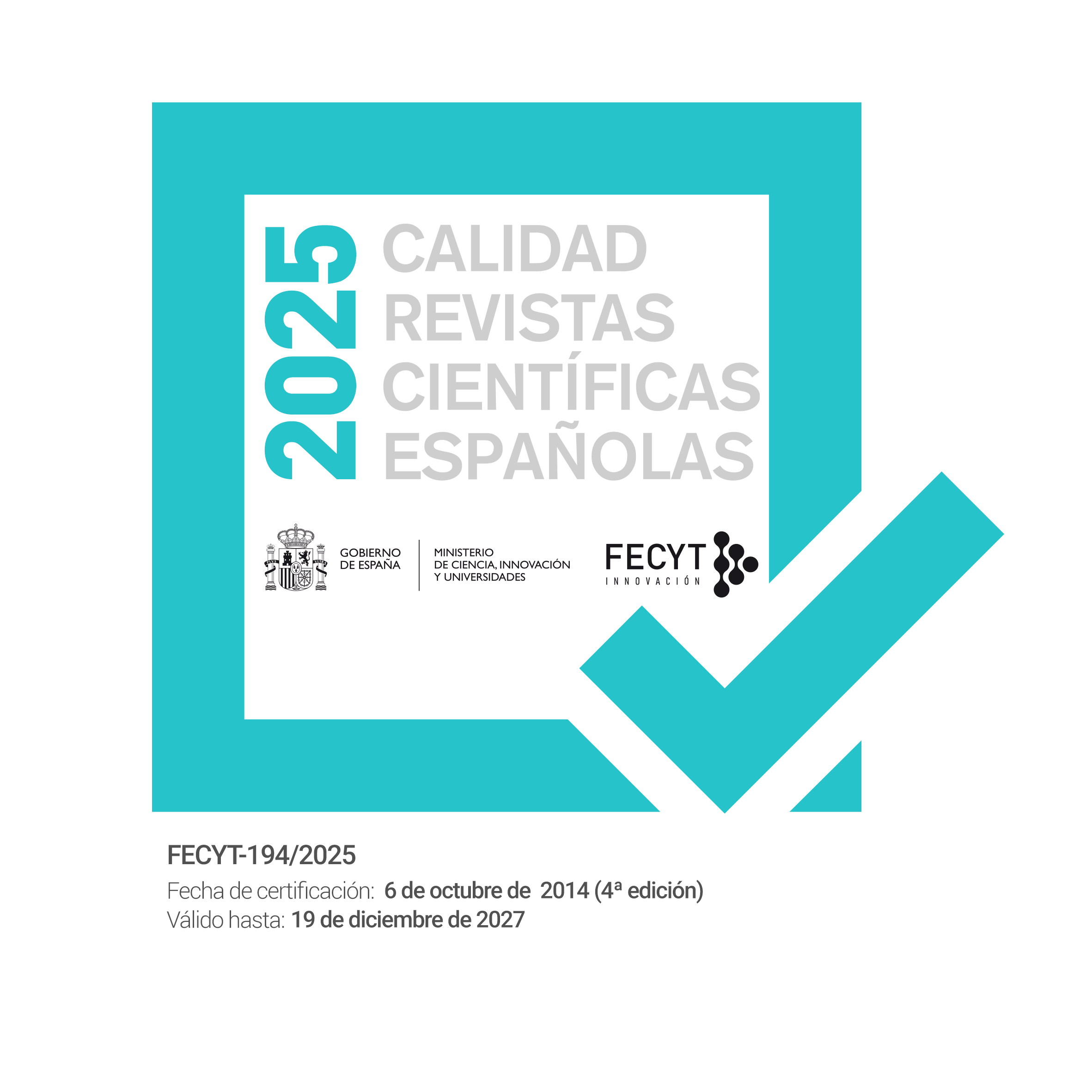La disputa marítima israelo-libanesa y el neofuncionalismo
DOI:
https://doi.org/10.21308/recp.50.05Palabras clave:
neofuncionalismo, desbordamiento, Unión por el Mediterráneo, Israel, Líbano, gas natural, seguridad energéticaResumen
La teoría neofuncionalista considera que una colaboración entre Estados en ciertas áreas de interés común posibilitará el avance hacia la integración regional y la resolución pacífica de los conflictos al percibirse las ventajas derivadas de dicha integración. De hecho, esta inspiración neofuncionalista ha estado presente en las políticas de la Unión Europea (UE) hacia el Mediterráneo. La tesis defendida en este artículo consiste en que, a diferencia de las expectativas neofuncionalistas, la aparición de importantes yacimientos de hidrocarburos a ambos lados de la división marítima entre Israel y el Líbano ha contribuido a generar una mayor inestabilidad en un área en el que las rivalidades existentes son especialmente sensibles a cualquier alteración en los equilibrios de poder. Además, el tradicional papel hegemónico de Estados Unidos se halla claramente debilitado y no puede realizar una mediación efectiva. Por su parte, los mecanismos de cooperación regional de la UE no constituyen un instrumento adecuado para superar este conflicto al no dar respuesta a las preocupaciones de seguridad existentes, de acuerdo con lo que predice la teoría realista.
Descargas
Citas
Abdel-Kader, Nizah. 2011. «Potential Conflict Between Lebanon and Israel over Oil and Gas Resources. A Lebanese Perspective», Defence Magazine. Disponible en: http://bit.ly/2Lqqo5q.
Adler, Emanuel y Beverly Crawford. 2006. «Normative Power: The European Practice of Region_Building and the Case of the Euro-Mediterranean Partnership», en Emanuel Adler, Federica Bicchi, Beverly Crawford y Raffaella A. Del Sarto (eds.), The Convergence of Civilizations: Constructing a Mediterranean Region. Toronto: University of Toronto Press. Disponible en: https://doi.org/10.3138/9781442621121-002.
Ahronheim, Anna. 2019. «Progress Made in Demarcation Talks between Israel and Lebanon», Jerusalem Post, 22-5-2019. Disponible en: http://bit.ly/2RFxNza.
Attinà, Fulvio. 2003. «The Euro-Mediterranean Partnership Assessed: The Realist and Liberal Views», European Foreign Affairs Review, 8: 181-199.
Baconi, Tareq. 2017. A Flammable Peace: Why Gas Deals Won´t End Conflict in the Middle East. ECFR Policy Brief. Disponible en: http://bit.ly/2XDeWKj.
Bahdat, Gawdat. 2015. «Israel´s Energy Security: Regional Implications», Middle East Policy Council Journal Essay, 28. Disponible en: http://bit.ly/2J3KVtG.
Ben-Abdallah, Moncef, Samir Allalk, Jacques Kappauf y Mourad Preure. 2013. Vers une communauté Euro-Méditerranée de l´énergie. IPEMED. Disponible en: http://bit.ly/2KGICA3.
Bicchi, Federica. 2007. European Foreign Policy Making towards the Mediterranean. Basingstoke: Palgrave. Disponible en: https://doi.org/10.1080/13629395.2011.547365.
Bicchi, Federica. 2011. «The Union for the Mediterranean or the Changing Context of Euro-Mediterranean Relations», Mediterranean Politics, 16 (1): 3-19.
Brown, L. Carl. 1984. International Politics and the Middle East: Old Rules, Dangerous Game. Princeton: Princeton University Press.
Charbonneau, Louis. 2011. «Lebanon´s Hariri Urges More Pressure on Israel», Reuters, 10-1-2011. Disponible en: https://reut.rs/2xi4wBc.
Costalli, Stefano. 2009. «Power over the Sea: The Relevance of Neo-Classical Realism to Euro-Mediterranean Relations», Mediterranean Politics, 14 (3): 323-342. Disponible en: https://doi.org/10.1080/13629390903346814.
Darbouche, Hakim, Laura El-Katiri y Bassam Fattouh. 2012. East Mediterranean Gas: What Kind of Game-Changer? The Oxford Institute for Energy Studies, NG 71. Disponible en: https://doi.org/10.26889/9781907555640.
Del Sarto, Raffaella. 2011. «Plus ça change...? Israel, the EU and the Union for the Mediterranean», Mediterranean Politics, 16 (19): 117-134. Disponible en: https://doi.org/10.1080/13629395.2011.547395.
Emerson, Michael y Gergana Noutcheva. 2005. From Barcelona Process to Neighbourhood Policy. Assessments and Open Issues. CEPS Working Document, 220. Bruselas: CEPS. Disponible en: http://bit.ly/2FwBSRh.
Escribano, Gonzalo. 2018. El gas del Mediterráneo Oriental como solución y como problema. Madrid: Real Instituto Elcano. Disponible en: http://bit.ly/2KI10ZE.
Even, Shmuel y Eran Oded. 2014. «The Natural Gas Revolution in Israel», INSS Insight, 100: 189-203. Disponible en: http://bit.ly/2FC1egH.
Fattouh, Bassam y Laura El-Katiri. 2015. Lebanon´s Gas Trading Options. Oxford: Lebanese Center for Policy Studies. Disponible en: http://bit.ly/2X5Arz9.
Gillespie, Richard. 2011. The Union for the Mediterranean: An Intergovernmentalist Challenge for the European Union? Journal of Common Market Studies, 49 (6): 1205-1225. Disponible en: https://doi.org/10.1111/j.1468-5965.2011.02193.x.
Gilpin, Robert. 1981. War and Change in World Politics. Nueva York: Cambridge University Press. Disponible en: https://doi.org/10.1017/CBO9780511664267.
Gostoli, Ylenia. 2017. «Israel-Europe Gas Deal Sparks Criticism», Al Jazeera, 23-4-2017. Disponible en: http://bit.ly/2KHX238.
Haas, Ernst. 1961. «International Integration: The European and the Universal Process», International Organization, 15 (3): 366-392. Disponible en: https://doi.org/10.1017/S0020818300002198.
Hasenclever, Andreas, Peter Mayer y Volker Rittberger. 2002. Theories of International Regimes. Cambridge: Cambridge University Press.
Hof, Frederick C. 2014. «Lebanon and Israel. A Line on the Water», en Sami Andoura y David Koranyi (eds.), Energy in the Eastern Mediterranean: Promise or Peril? Egmont Paper, 65. Bruselas: Royal Institute of International Affairs.
Hoffmann, Stanley. 1966. «Obstinate or Obsolete: The Fate of the Nation State and the Core of Western Europe», Daedalus, 95 (3): 862-915.
Holden, Patrick. 2011. «A New beginning? Does the Union for the Mediterranean Herald a New Functionalist Approach to Co-operation in the Region?», Mediterranean Politics, 16 (1): 155-169. Disponible en: https://doi.org/10.1080/13629395.2011.547405.
Katz, Yaacob. 2011. «IDF Deploy Drones to Protect Gas Fields from Hezbollah», Jerusalem Post, 9-8-2011. Disponible en: http://bit.ly/2JeZRoT.
Keohane, Robert O. 1984. After Hegemony: Cooperation and Discord in the World Political Economy. Princeton: Princeton University Press.
Keohane, Robert O. y Nye, Joseph S. 1977. Power and Interdependence: World Politics in Transition. Boston: Little, Brown.
Keohane, Robert O. y Joseph S. Nye. 1987. «Power and Interdependence Revisited», International Organization, 41 (4): 725-753. Disponible en: https://doi.org/10.1017/S0020818300027661.
Krasner, Stephen. 1982. «Structural Causes and Regime Consequences: Regimes as Intervening Variables», International Organization, 36 (2): 185-205. Disponible en: https://doi.org/10.1017/S0020818300018920.
Meguerditchian, Van. 2011. «Geagea Says Nasrallah Remarks Hurting Oil and Gas Interests». The Daily Star, 30-7-2011. Disponible en: http://bit.ly/2IRJKi8.
Meier, Daniel. 2013. Lebanon´s Maritime Boundaries: Between Economic Opportunities and Military Confrontation. Oxford: Center for Lebanese Studies, Universidad de Oxford.
Meletti, Giorgio. 2003. «L´Union pour la Méditerranée : la paix energétique», Outre-Terre, 23: 203-223. Disponible en: https://doi.org/10.3917/oute.023.0203.
Muradova, Lala. 2016. «Oil Wealth and Authoritarianism: Algeria in the Arab Spring», Revista Española de Ciencia Política, 40: 63-89.
Niemann, Arne y Demosthenes Ioannou. 2015. «European Economic Integration in Times of Crisis: A Case of Neofunctionalism?», Journal of European Public Policy, 22 (2): 196-218. Disponible en: https://doi.org/10.1080/13501763.2014.994021.
O´Connor, Tom. 2018. «Middle East Next Oil War? Israel Threatens Lebanon over Hezbollah and Natural Gas», Newsweek, 1-2-2018.
Osseiran, Karim. 2015. Energy Security: The Lebanese Case. CEDRO-UNDP. Disponible en: http://bit.ly/2Ja721T.
Panebianco, Stefania. 2010. «Volatile Regionalism in the Mediterranean Area», L´Europe en Formation, 356: 153-167. Disponible en: https://doi.org/10.3917/eufor.356.0153.
Raz, Hila y Avi Bar-Eli. 2010. «Hizballah: Offshore Gas Is Lebanese», Haaretz, 15-6-2010. Disponible en: http://bit.ly/2xfWYi2.
Rosamond, Ben. 2005. «The Uniting of Europe and the Foundation of EU Studies: Revisiting the Neofunctionalism of Ernst B. Haas», Journal of European Public Policy, 12 (2): 237-264. Disponible en: https://doi.org/10.1080/13501760500043928.
Ruggiero, Luca. 2014. «Renewable Energy and the Euro-Mediterranean Partnership Following the Arab Spring», Bollettino della Società Geografica Italiana, Serie XIII (7): 359-373.
Schmitter, Philippe C. 2003. «Neo-neofunctionalism», en Ante Wiener y Thomas Diez (eds.), European Integration Theory. Oxford: Oxford University Press.
Shaffer, Brenda. 2013. «Natural Gas Supply Stability and Foreign Policy», Energy Policy, 56: 114-125. Disponible en: https://doi.org/10.1016/j.enpol.2012.11.035.
Staff, Toi. 2018a. «Hezbollah Issues Fresh Threat against Israel´s Offshore Gas Riggs», Times of Israel, 18-2-2018. Disponible en: http://bit.ly/31YkkXG.
Staff, Toi. 2018b. «Israel, Cyprus, Greece and Italy Agree on 7$b. East Mediterranean Gas Pipeline to Europe», Times of Israel. 24-11-2018. Disponible en: http://bit.ly/2J3NhJ2.
Sukkarieh, Mona. 2015. «Thinking Ahead: Lebanon Can Learn from Israel´s Bumbling Regulatory Changes for Offshore Gas», Executive Magazine, 15-4-2015. Disponible en: Disponible en: https://doi.org/10.1787/9789264238770-4-en.
Tahhan, Zena. 2016. «Jordanians Reject “Stolen Gas” in Israel-Jordan Deal», Al Jazeera, 3-10-2016. Disponible en: http://bit.ly/2X8DLJM.
Tranholm-Mikkelsen, Jeppe. 1991. «Obstinate or Obsolete? A Reappraisal in the Light of the New Dynamism of the EC», Millenium, 20 (1): 1-22. Disponible en: https://doi.org/10.1177/03058298910200010201.
Udasin, Sharon. 2012. «Experts: Israel Should Not Export Natural Gas». Jerusalem Post, 19-3-2012. Disponible en: http://bit.ly/2RGADUh.
Valori, Giancarlo. 2019. «The Lebanon, Natural Gas and Local Political Equilibria», Modern Diplomacy, 13-2-2019. Disponible en: http://bit.ly/2RCklMa.
Vogler, Sarah y Eric V. Thompson. 2015. Gas Discoveries in the Eastern Mediterranean. Implications for Regional Maritime Security. German Marshall Fund Policy Brief. Washington: German Marshall Fund. Disponible en: http://bit.ly/2X5D3gz.
Waltz, Kenneth. 1979. Theory of International Politics. Nueva York: McGraw-Hill.
Wohlforth, William C. 2011. «Gilpinian Realism and International Relations», International Relations, 25 (4): 499-511. Disponible en: https://doi.org/10.1177/0047117811411742.
Zisser, Eyal. 2000. Lebanon. The Challenge of Independence. Londres: I. B. Tauris.
Publicado
Cómo citar
Número
Sección
Licencia
Derechos de autor 2019 Javier Lion-Bustillo

Esta obra está bajo una licencia internacional Creative Commons Atribución-NoComercial-SinDerivadas 4.0.






